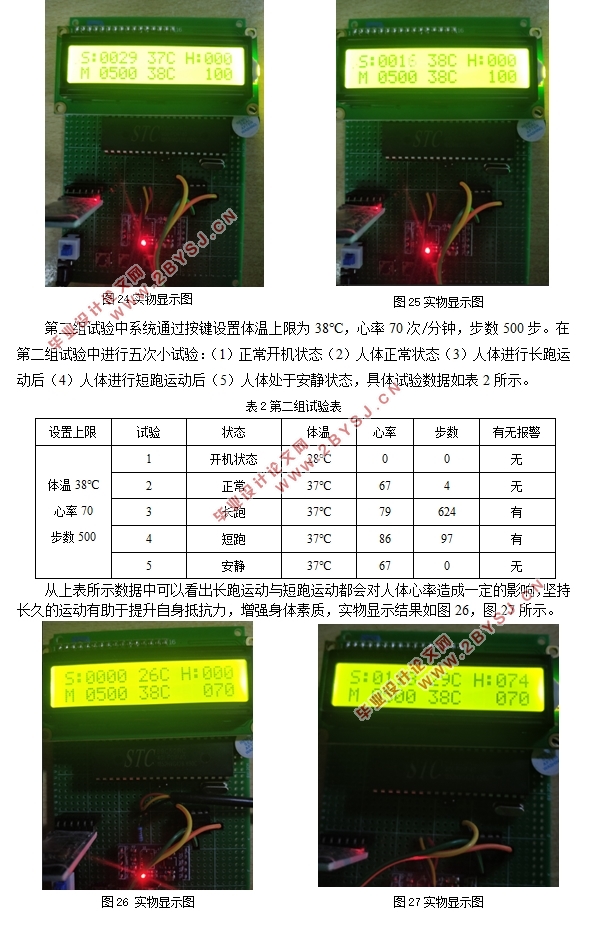基于单片机的人体生理状态监测系统的设计(附电路图)
无需注册登录,支付后按照提示操作即可获取该资料.
基于单片机的人体生理状态监测系统的设计(附电路图)(论文10600字)
摘要:生活水平提高,人们越来越关注自身的健康状况。人体突发疾病或隐藏的慢性疾病会引起体温、心率的异常变化,为了便于对人体生理状态的监查,本文设计了基于STC89C52RC单片机的人体生理状态监测系统。系统基于STC89C52RC单片机由Pulse Sensor、DS18B20、ADXL345传感器分别监测人体心率、体温和运动步数,传感器把检测的数据传输到单片机中,通过电路和HC-05传输到LCD1602或手机界面进行实时显示。系统实验结果证实了该系统的能有效监测人体心率、体温和步数。
关键字:STC89C52RC单片机;Pulse Sensor;DS18B20;ADXL345;蓝牙
Human physiological condition monitoring system based on Microcontrollers
Abstract:As the standard of living improves, people are paying more and more attention to their own health. Human body sudden illness or hidden chronic diseases can cause abnormal changes in body temperature and heart rate. In order to facilitate the examination of human physiological state, this paper designs a human physiological condition monitoring system based on STC89C52RC microcontroller. The system monitors the heart rate, body temperature and motion status of the human body by Pulse Sensor, DS18B20 and ADXL345 based on STC89C52RC. The sensor transmits the detected data to the MCU, and transmits it to the LCD1602 or mobile phone interface for real-time display through the circuit and HC-05. Systematic experimental results confirmed that the system can effectively monitor human heart rate, body temperature and number of steps.
Keywords:STC89C52RCMCU;Pulse Sensor;DS18B20;ADXL345;Bluetooth


目录
1.引言 1
1.1背景和意义 1
1.2国内外研究现状 2
2.方案论证 3
2.1系统设计目的 3
2.2方案论证 3
2.2.1主控器的选择与论证 3
2.2.2心率传感器的选择与论证 3
2.2.3体温传感器的选择与论证 4
2.2.4加速度传感器的选择与论证 5
2.3系统方案 5
3.系统总体设计 6
3.1系统框图 6
3.2系统电路图 6
4.模块硬件电路设计 7
4.1心率检测模块 7
4.2体温测量模块 7
4.3计步模块 7
4.4蓝牙模块 8
4.5显示模块 9
4.6报警模块 9
4.7STC89C52RC单片机 9
4.8电源模块 10
5.系统程序设计 11
5.1软件开发工具 11
5.2系统软件总体设计 11
5.2.1数据检测模块 11
5.2.2中央处理模块 12
5.3心率传感器驱动程序 13
5.4温度传感器驱动程序 13
5.5加速度传感器驱动程序 14
5.6显示模块驱动程序 14
5.7报警模块驱动程序 14
6.实验与验证 16
7.总结与展望 19
7.1总结 19
7.2展望 19
参考文献 20
致谢 21
